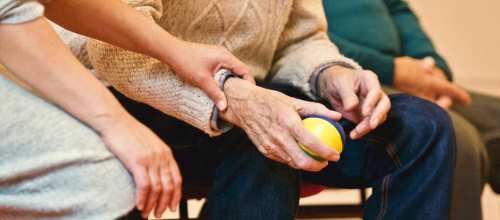General Listening Quiz
“Assisted Living”
| Level | Topic | Speakers | Length |
|---|---|---|---|
| Difficult | Assisted Living and Memory Care | Man – Woman | 03:44 |

Pre-Listening Exercise
[ Note from Randall: My mother passed away on January 22, 2017, about a week after I finished this recording, and in memory of her, I invite visitors to learn about her life by doing this listening activity. ]
Randall’s mother has Alzheimer’s disease, and his family is trying to do the best they can to provide for her comfort. Such health conditions affect many senior citizens in our communities. What special care centers are there in your hometown in your country that provide special care for these individuals? In what cases do families care for the elderly? Under what conditions are special care centers needed?
Agree or Disagree? Let’s Spark Some Conversation!
These statements are designed to get everyone thinking, exploring ideas, and sharing opinions.
-
In a face-to-face classroom: Read each statement aloud. If you agree, move to one side of the room; if you disagree, move to the other. Talk with your group—why do you feel that way?
-
In an online classroom: Use polls, emojis, or the chat box in your online platform to show your opinion. Then, join the conversation as a group or in breakout rooms.
-
For independent learners: Read each statement and think about your opinion. Then say your answer out loud and explain your reason, as if you’re talking to a classmate.
- Most older adults are happier living at home than in assisted living.
- Families should care for elderly parents themselves whenever possible.
- Assisted living communities provide better medical care than family members can.
- Moving into senior care should be the older person’s choice, not the family’s.
- It’s better to plan for senior care early, even if it feels uncomfortable.
- Technology can help seniors stay independent longer.
- Assisted living is too expensive for many families.
- Seniors living with others their own age feel less lonely.
- Caregivers need just as much support as the seniors they care for.
- A good senior care facility should feel like home, not a hospital.
Idioms
“pull through” = recover from an illness
“Grandma had a serious accident in her car, but the doctors think that she’s going to pull through.”
“run in the family” = to be common in the family
“The doctors said that this disorder might run in the family.“
Listening Exercise
A. Listen to the recording and answer the questions.
Vocabulary Practice
Do the vocabulary quizzes with the words from the conversation for more practice:
Post-Listening Exercise
Describe your relationship with a family member or friend who has suffered from the effects of age. What were the first signs of dementia or Alzheimer’s Disease? How did the family deal with the situation, financially, physically, and emotionally?
Online Investigation
Use the internet to find the answers to some of these questions about Alzheimer’s Disease:
- What is the difference between Alzheimer’s disease and dementia?
- What are the symptoms of Alzheimer’s disease?
- What are the causes of Alzheimer’s disease?
- What tests are used to diagnose Alzheimer’s disease?
- Why is it important to detect Alzheimer’s as early as possible?
- What are the stages of Alzheimer’s?
- Are there genetic risk factors for the disease?
- What is the average age of people who have Alzheimer’s?
- Do men or women have a higher chance of developing the disease?
- How can the disease be treated?
- What advice should family members be given to help them deal with family members with Alzheimer’s?
- What is the life expectancy of someone with Alzheimer’s?
- Is there anything you can do to reduce your risk of Alzheimer’s?